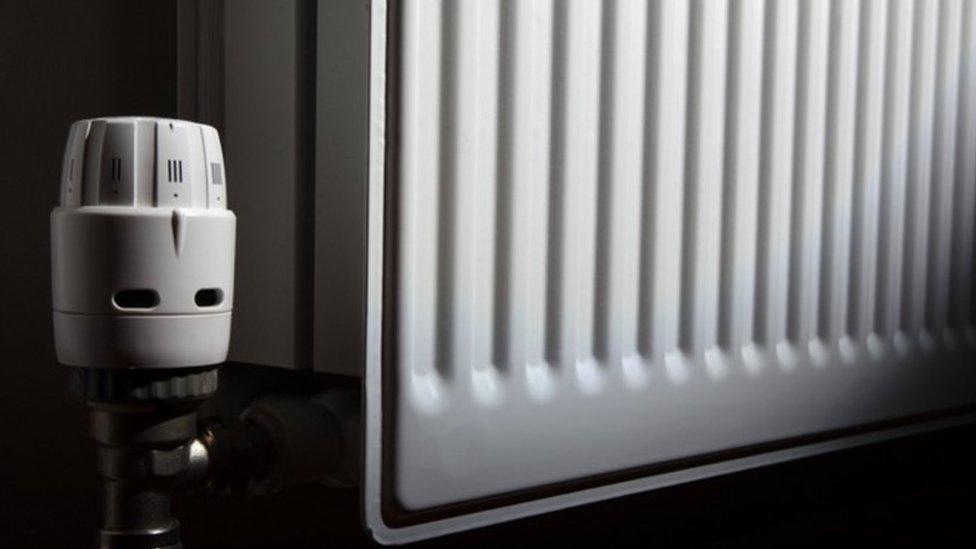Green heating system accused of causing 'fuel poverty'
- Published
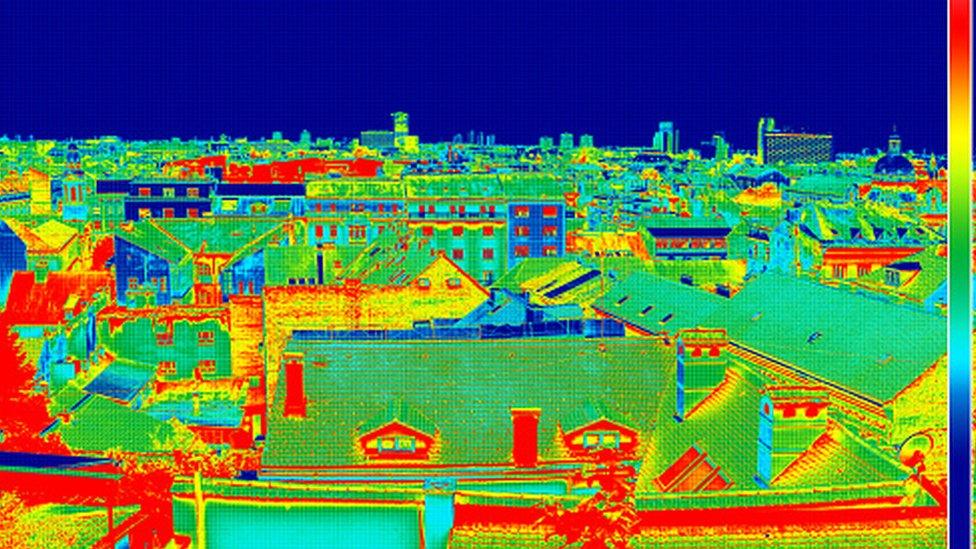
District heating is seen as a new cleaner, cheaper way to keep homes warm, but some residents say it's not working as well as it should.
A heating system meant to reduce bills is leaving people in fuel poverty, according to campaigners and residents.
The government wants millions of us to get heat and hot water from "district heating networks" to help meet carbon reduction targets.
But residents on some networks say they are more expensive than traditional heating and have been beset with problems.
Providers are working to tackle issues and say some schemes work brilliantly.
Instead of having a gas boiler in every home, heat networks send heat and hot water to numerous properties along a system of underground pipes from one central communal heat source.
This could be a mini-power station in the middle of a housing estate, or waste heat from a recycling plant or a factory.
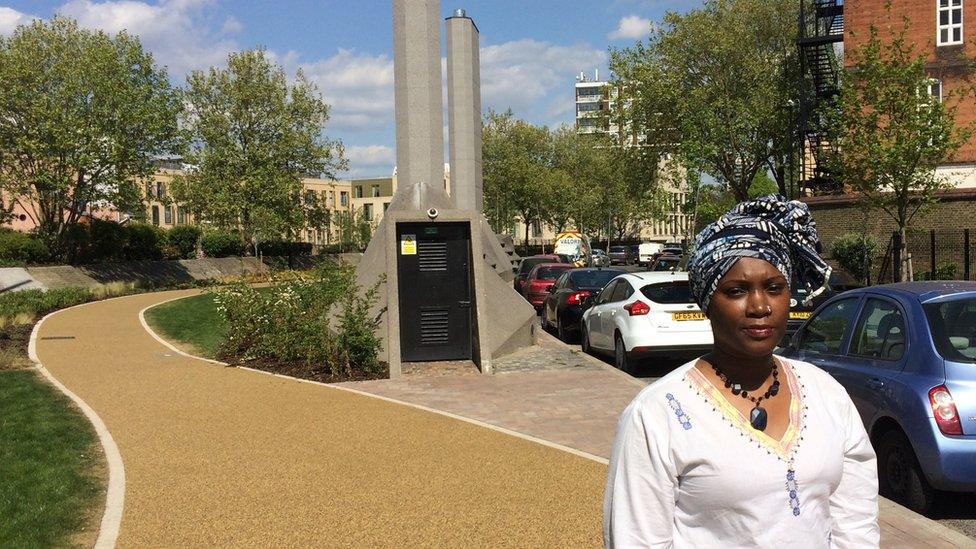
Uzoamaka Okafor says the heating provided by the submarine power station has been beset with problems.
Those living on the Myatt's Field North Oval Quarter estate in Lambeth, South London get heat from a small power station in a building known as the submarine. The system, run by E.on, was installed when the estate was redeveloped.
Uzoamaka Okafor, chair of the residents' association, said the problems were causing a lot of distress, particularly to elderly and vulnerable residents.
She said some smart meters did not work, which meant people were being sent high estimated bills, including some who were being asked for hundreds of pounds a month.
She said: "It's been riddled with issues, from intermittent hot water and heating, a number of outages, to concerns around high estimates bills, customer service and technical faults.
"There are lots of residents that do not put their heating on at all; they go to bed early. I've bought one resident blankets, because she's so distressed about bills she doesn't want to put the heating on."
Residents said some people were having to choose between heating and eating.
No food
A report about the problems on the estate, external, written by Ruth London from Fuel Poverty Action and Stuart Hodkinson from the University of Leeds, said there had been heat outages on 48 days in four years.
It detailed individual cases of vulnerable people left without heat for weeks and months on end.
It also details the case of Edward Connell, an elderly man thought to have been suffering with a form of dementia who told people he was struggling with high bills. He died of heart failure in October. The report said there was no food in his flat when he died.
In February, after a meeting with E.on about problems on the estate, residents were sent a letter of apology by the head of the company's heat division, Jeremy Bungey.
A spokesman told the BBC E.on did not agree with all of the points raised in the report, but acknowledged there had been issues.
He said many had been resolved some time ago. He urged anyone with problems with their smart meter to get in touch.
In relation to Mr Connell, he said: "This is clearly a very sad case, but we have no insight into the wider circumstances of his death and the factors which may have led to it."
He said the company had spoken to Mr Connell a number of times when he moved into the property in 2015 and that in June, after providing a manual meter reading, he was found to be in credit.
'Potential to reduce costs'
At the moment, 200,000 people rely on district heating, but the government is championing the system and has put up £320m in seed funding to encourage more heat networks to be built in towns and cities across England and Wales.
It wants 18-20% of heat to come from district heating by 2050, in a bid to help meet carbon reduction targets.
According to the Department for Business, Energy and Industrial Strategy website, heat networks "have the potential to reduce heating costs, in some cases by more than 30%, external".
But some customers say they have not seen the promised savings, and a traditional gas boiler would be much cheaper for them.
Charles Montlake, who lives in New Capital Quay in Greenwich, South East London has district heating in his flat which is also provided by E.on.
He was given £669 in an out-of-court settlement with the energy giant after he lodged papers with the small claims court saying he had been overcharged for his heating for a year.
E.on says it believes it offers Mr Montlake value for money.
80-year contracts
Unlike traditional energy customers, people like Mr Montlake on district heating cannot go to Ofgem to complain about bills, because district heating is currently largely unregulated.
Customers can go to the energy ombudsman and a body set up by a number of providers called the Heat Trust, but their powers are limited.
And while traditional power users can switch suppliers if they are not happy with pricing or customer service, those on district heating are locked into long contracts.
Mr Montlake told 5 live Investigates: "Our contract is for 25 years, so our current alternatives are move or don't use heat."
Ms London said she had come across contracts locking customers in for 40 and even 80 years, and estates where those who owned their own homes were moving house because they could not afford the mortgage and the heat bills.
She said the problem was particularly acute for people on low incomes, like some of those living on the Myatt's Field North Oval Quarter estate.
She said: "It's some of the worst fuel poverty we've seen.
"We're afraid the same thing is going to happen to heating systems all over the UK, where people are actually not able to cover their heating costs and they're going cold and potentially even losing their lives, as well as their health, as a result.
"The industry has to be regulated, it is absolutely not acceptable that it should be a wild-west situation where companies can do what they like."
'Tackled these issues'
Tim Rotheray, director of the Association of Decentralised Energy, said: "Across the country, these schemes have been lifting people out of fuel poverty and making cold homes warm.
"But any evidence of unhappy customers is a serious concern.
"A good experience for customers is not only vital for them, but also for the future of the industry.
"We recognise the new and changing nature of this industry means that sometimes quality and customer service standards are not good enough. The industry has tackled these issues head on.
"In March we launched a new task force, attended by consumer groups, investors, developers and observed by government and Ofgem.
"The group is examining both industry and regulatory options to ensure all aspects of consumer protection can be an integral part of enabling new investment."
To hear more about this story, tune into 5 live Investigates on Sunday April 30 at 11am or listen to the podcast.
- Published26 January 2017
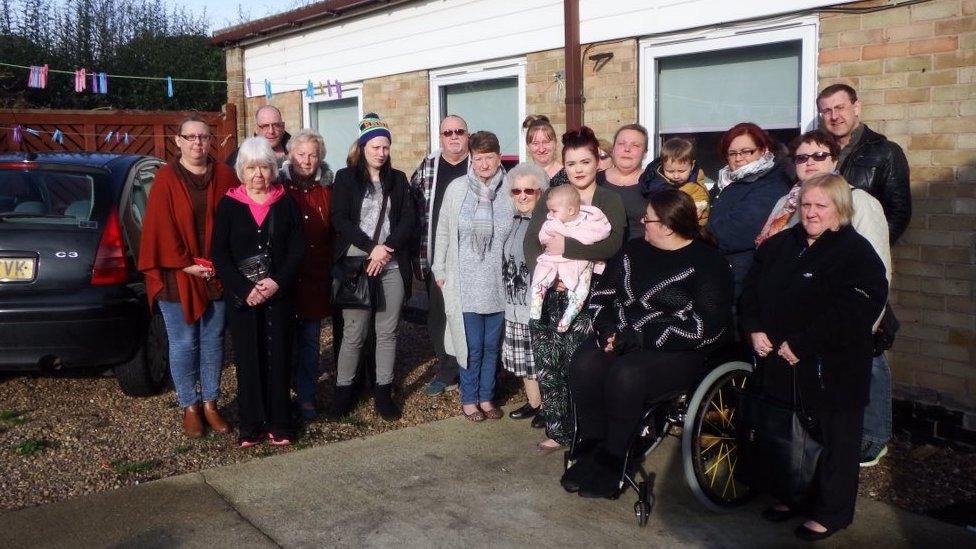
- Published18 January 2017
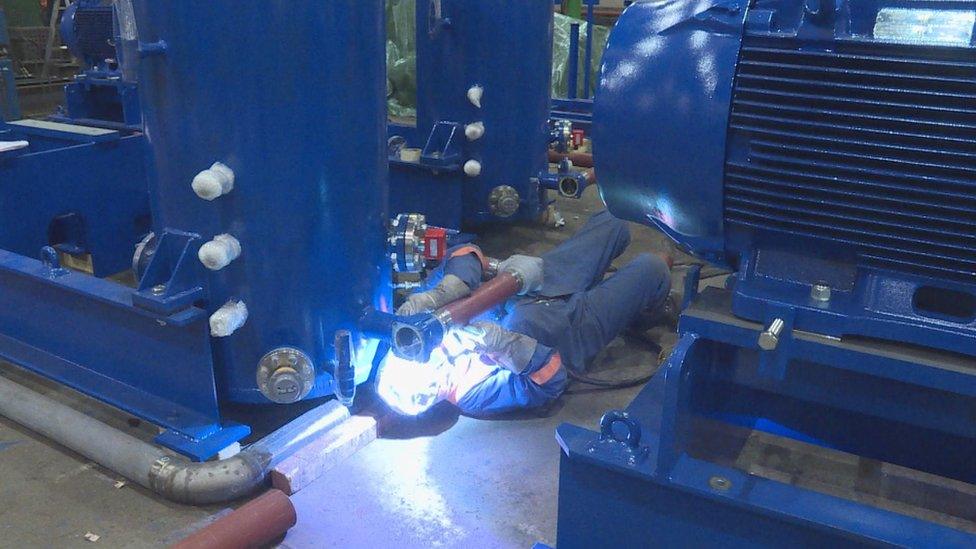
- Published31 May 2016
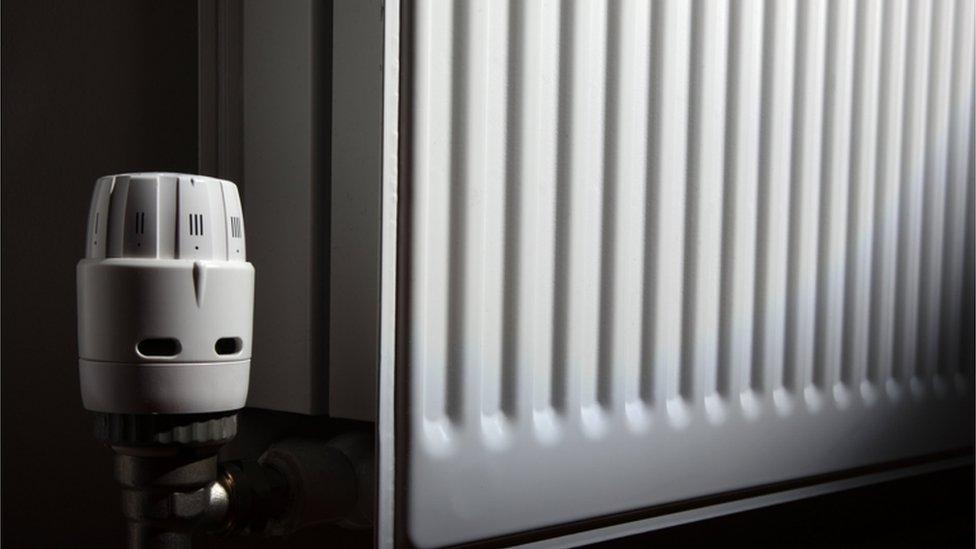
- Published7 January 2016
